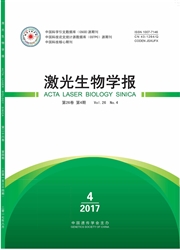

 中文摘要:
中文摘要:
血清白蛋白(HSA)是人体中重要的药物结合蛋白。药物在体内和血清白蛋白可逆性地结合可以增强药物的生物兼容性、延长药物半衰期并达到缓释的效果。但是研究发现药物和白蛋白的结合有时也会形成负面的影响。本文以能和活性氧反应的化学发光试剂FCLA为分子探针,研究分析了HSA和药物的相互作用及产生的影响。实验发现,HSA能通过与FCLA分子的结合,对FCLA的氧化产生类似于酶催化效果,通过降低氧化反应所需的活化能加速了探针的氧化过程。研究结果表明,HSA和某些药物的结合能够引起药物抗氧化能力或抗药物交叉反应能力的改变,因此在利用HSA携带药物时,需要考虑结合所导致的药物稳定性的降低。该研究有助于揭示体内的药物动力学问题,指导合理用药,同时对于进行药物分子设计、开发新药也具有重要的指导意义。
 英文摘要:
英文摘要:
Human Serum Albumin (HSA) is a very important drugplasma protein. Many drugs can bind reversibly with HSA in plasma, resulting in an enhanced biocompatibility and delayed lifetime. However, for some drugs the bind ing can also induce some negative effects during their application. In our study, a chemiluminescence molecular reagent FCLA, which can react with reactive oxygen, was used as a probe to detect the interaction. The results indicate that FCLA can be bind to HSA. HSA provides a catalytic effect to accelerate the oxidation reaction, just as the enzymatic ac tion. The mechanism is deduced that may be due to the decreased reaction energy for the drugprotein binding. It means that as drugs bind to HSA, their antioxidative ability decreases or the interaction between different drugs is more easily aroused. This study will be helpful for the drug invention, designing and application.
 同期刊论文项目
同期刊论文项目
 同项目期刊论文
同项目期刊论文
 Microwave-induced thermoacoustic computed tomography with a clinical contrast agent of NMG(2)[Gd(DTP
Microwave-induced thermoacoustic computed tomography with a clinical contrast agent of NMG(2)[Gd(DTP Photoacoustic viscoelasticity imaging of biological tissues with intensity-modulated continuous-wave
Photoacoustic viscoelasticity imaging of biological tissues with intensity-modulated continuous-wave Gadolinium(III)-gold nanorods for MRI and photoacoustic imaging dual-modality detection of macrophag
Gadolinium(III)-gold nanorods for MRI and photoacoustic imaging dual-modality detection of macrophag Reflection-mode photoacoustic microscopy using a hollow focused ultrasound transducer for in vivo im
Reflection-mode photoacoustic microscopy using a hollow focused ultrasound transducer for in vivo im Simultaneous optical absorption and viscoelasticity imaging based on photoacoustic lock-in measureme
Simultaneous optical absorption and viscoelasticity imaging based on photoacoustic lock-in measureme Dextran based pH-sensitive near-infrared nanoprobe for in vivo differential-absorption dual-waveleng
Dextran based pH-sensitive near-infrared nanoprobe for in vivo differential-absorption dual-waveleng Microwave-induced thermoacoustic computed tomography with a clinical contrast agent of NMG2[Gd(DTPA)
Microwave-induced thermoacoustic computed tomography with a clinical contrast agent of NMG2[Gd(DTPA) In vivo detection of hemoglobin oxygen saturation and carboxyhemoglobin saturation with multiwavelen
In vivo detection of hemoglobin oxygen saturation and carboxyhemoglobin saturation with multiwavelen Thermoacoustic imaging over large field of view for three-dimensional breast tumor localization: A p
Thermoacoustic imaging over large field of view for three-dimensional breast tumor localization: A p Mechanical characterization of intraluminaltissue with phase-resolved photoacousticviscoelasticity e
Mechanical characterization of intraluminaltissue with phase-resolved photoacousticviscoelasticity e Toward in vivo biopsy of melanoma based on photoacoustic and ultrasound dual imaging with an integra
Toward in vivo biopsy of melanoma based on photoacoustic and ultrasound dual imaging with an integra Targeted Fe-filled carbon nanotube as a multifunctional contrast agent forthermoacoustic and magneti
Targeted Fe-filled carbon nanotube as a multifunctional contrast agent forthermoacoustic and magneti Ultrashort Microwave-Induced Thermoacoustic Imaging: A Breakthrough in Excitation Efficiency and Spa
Ultrashort Microwave-Induced Thermoacoustic Imaging: A Breakthrough in Excitation Efficiency and Spa Integrated mechanical and structural featuresfor photoacoustic characterization ofatherosclerosis us
Integrated mechanical and structural featuresfor photoacoustic characterization ofatherosclerosis us Fluorescence Quenching Nanoprobes Dedicated to InVivo Photoacoustic Imaging and High-Effi cient Tumo
Fluorescence Quenching Nanoprobes Dedicated to InVivo Photoacoustic Imaging and High-Effi cient Tumo A microwave detection way by electromagnetic and elastic resonance: Breaking the bottleneck of spati
A microwave detection way by electromagnetic and elastic resonance: Breaking the bottleneck of spati Characterization of lipid-rich aortic plaques by intravascular photoacoustic tomography: ex vivo and
Characterization of lipid-rich aortic plaques by intravascular photoacoustic tomography: ex vivo and 期刊信息
期刊信息
